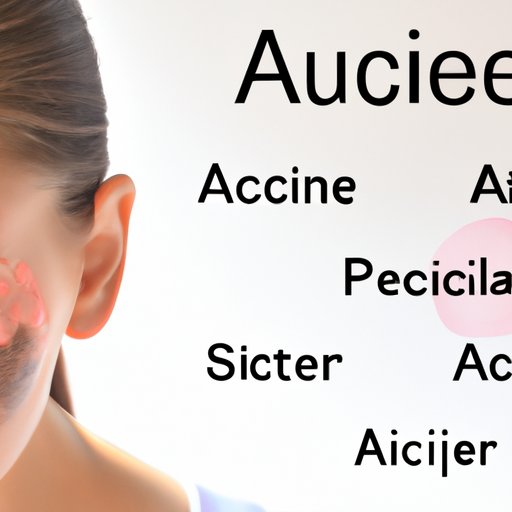Introduction
Acne is a common skin condition that affects people of all ages. While it often clears up on its own, it can leave behind scars that can last for months or even years. But are acne scars permanent? In this article, we’ll explore the lifespan of acne scarring and examine different treatment options to reduce their appearance.
Investigating the Lifespan of Acne Scars: Are They Permanent?
When it comes to acne scarring, it’s important to determine the type of scarring you have. There are two types of acne scars: atrophic scars, which appear as indentations in the skin, and hypertrophic scars, which are raised above the surface of the skin. Both types of scars can be present on the same person.
The duration of acne scars depends on several factors, such as the severity of the acne, the type of scarring, and the age of the person. Younger people tend to heal more quickly than older people, so their scars may fade faster. Additionally, people with darker skin tones may experience longer-lasting scars due to increased melanin production.
Atrophic scars are usually the result of cystic acne and can take months or even years to fade. Hypertrophic scars, on the other hand, are caused by inflamed blemishes, such as pustules. These scars are typically temporary and should fade within a few weeks or months.
Exploring Different Treatment Options to Reduce the Appearance of Acne Scars
Once you’ve identified the type of scarring you have, it’s time to explore different treatment options to reduce their appearance. Home remedies, such as honey masks and lemon juice, may help lighten the appearance of acne scars over time. However, these treatments are not always effective and can cause irritation or allergic reactions.
Professional treatments, such as laser therapy, chemical peels, and microneedling, are more effective but require multiple sessions and can be expensive. For more severe cases of acne scarring, plastic surgery may be an option. This procedure can help reduce the appearance of deep scars, but it is invasive and carries a risk of infection.

Examining How Diet Impacts Acne Scarring
Diet also plays an important role in the healing process of acne scars. Eating a healthy, balanced diet rich in fruits, vegetables, and lean proteins can help promote skin health and reduce inflammation. Additionally, limiting processed foods and sugary snacks can help improve your overall health and reduce the risk of further breakouts.
Certain vitamins and minerals are essential for skin health and may help reduce the appearance of acne scars. Vitamin A helps stimulate cell turnover, while vitamin C boosts collagen production and reduces inflammation. Zinc can also help reduce inflammation and may reduce the risk of future breakouts.
Understanding the Science Behind Acne Scarring
Acne scarring occurs when the body produces too much collagen during the healing process. Excess collagen builds up in the affected area, forming a raised scar. Genetics can also play a role in acne scarring, as some people are more prone to developing scars than others.
In some cases, the body may produce too little collagen, resulting in an indentation in the skin. This is known as atrophic scarring and is usually caused by cystic acne. Atrophic scars are often deeper and more difficult to treat than hypertrophic scars.

Comparing Natural Remedies for Acne Scar Reduction
There are several natural remedies that may help reduce the appearance of acne scars. Aloe vera gel can help reduce inflammation and promote healing. Apple cider vinegar is also thought to reduce inflammation and kill bacteria. Other natural remedies, such as honey and tea tree oil, may help reduce redness and discoloration.
It’s important to note that natural remedies are not always effective and may cause irritation. Additionally, natural remedies often take longer to work than professional treatments, so it’s best to consult a dermatologist before trying any home remedies.

Evaluating the Effectiveness of Professional Treatments for Acne Scars
Professional treatments, such as laser therapy, chemical peels, and microneedling, can be more effective than natural remedies. These treatments can help reduce the appearance of both atrophic and hypertrophic scars. However, they can be expensive and may require multiple sessions to achieve desired results.
It’s important to weigh the risks and benefits of each treatment before making a decision. Always consult a medical professional to discuss the best options for your particular case.
Conclusion
Acne scars can be permanent, depending on the type of scarring and the individual’s age and skin tone. There are several treatment options available to reduce their appearance, including home remedies, professional treatments, and dietary changes. However, it’s important to consult a medical professional before trying any treatments.
By understanding the science behind acne scarring, exploring different treatment options, and evaluating the effectiveness of professional treatments, you can make an informed decision about what’s best for your particular case.


